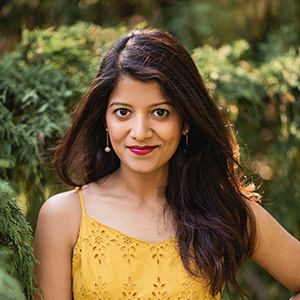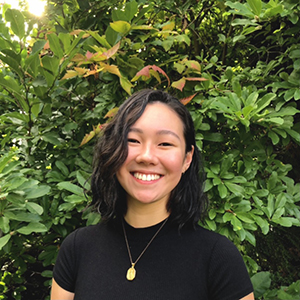About Power: Anne Hung in Conversation with Deepa Rajagopalan

Volunteer Anne Hung talks with Deepa Rajagopalan, winner of the 2023 Open Season Fiction Award with her story, “Cake” (featured in spring issue #222). They discuss truth telling in fiction, finding ways to hold beauty, and how our experiences shape the way we respond to powerlessness.
Deepa Rajagopalan won the 2021 RBC/PEN Canada New Voices Award for her short story “Peacocks of Instagram.” Her writing has appeared or is forthcoming in literary magazines such as Room Magazine, Arc Poetry Magazine, EVENT magazine, and The Quarantine Review. She has an MFA in Creative Writing from the University of Guelph.
First, congratulations on winning the 2023 Open Season Fiction Award! “Cake” is a subtle but powerful story that follows an unapologetic and resourceful protagonist through a series of upsetting but unfortunately common workplace incidents. One of the most striking things about “Cake” is its ability to move between mundane, violent, bitter, satisfying, and contemplative moments without disorienting the reader. What first moved you to write about this range of experiences?
Thank you so much, Anne. Winning this award from The Malahat Review truly means a lot to me.
I often ask myself—what is the purpose of fiction? To me, it’s truth telling. We make up stories so we can be honest to ourselves and our readers about how we truly feel. And how do we truly feel on any given day? How do we find ways to hold beauty? I think about beauty existing alongside everything else. The ugly, awful, traumatic, and the beautiful, joyful, life-affirming, existing together simultaneously, often in the same sentence.
One moment you’re elated by some personal success—you get a new job, or you win an award, and then you hear sirens and realize that someone’s life is falling apart. Maybe your own life is falling apart in another area. All of these things coexist simultaneously, and it wouldn’t be truthful if you write about one experience while ignoring another.
“Cake” opens with a description of the protagonist’s nails—“chipped, a blistering maroon”—and ends with them “sparkl[ing] under the salon’s fluorescent lights.” Her maltreatment throughout the story and her burning eyes at its conclusion are contrasted by a hint of optimism in the transformation of her nails. What do you hope readers take away from this transformation?
What I love about the short story form is that you have freedom to decide the entry point to your story. You don’t have to start at the beginning, but you still have to let the reader feel the lifetime your character has lived.
It was very important to me that Rania’s rage was quiet. She’s not a loud person, and her revenge couldn’t be loud. She took the thing Jasper thought was frivolous—him sharing his feelings with her—and used it against him.
It was also important to me to not make Rania “innocent,” as in, she didn’t initially reject his advances. Dionne Brand once told me you don’t need someone to be innocent for violence to be violence. By showing the innocence of a character before something violent happens to them takes away responsibility from the person committing the act of violence.
When there’s a transformation at the end of the story, it is subtle. The transformation of her nails is exactly what you said—a hint of optimism, but she is constantly reminded of what the transformation cost her.
Another of your award-winning stories, “Peacocks of Instagram,” centres on immigrant women who “live and think and feel,” and “question[s] what it means to be safe, to feel safe, to survive.” “Cake” does similar work—providing an intimate look into the protagonist’s life, thoughts, and feelings as an immigrant worker experiencing discrimination and fighting to survive. Can you speak to these parallels and how your writing has evolved between these two stories?
I am fascinated by power. Who has it? Who doesn’t? Who gets to claim theirs? How do our experiences shape how we respond to being powerless?
I wrote “Peacocks of Instagram” in 2021, and I was consumed by what was happening in the world then. A pandemic brought the world to its knees. Millions of Indian farmers took to the streets to protest detrimental farm bills. I watched a documentary on sexual selection in peafowl. So, the story I was writing found its setting in a landscape that brought all these elements together, but in its core, I was talking about power.
When I started to write “Cake,” I was thinking about the MeToo movement, and the ways in which power is taken from women. A large portion of the MeToo conversation was geared towards celebrities, but I wanted to talk about it in the context of someone who has a lot less privilege. Rania’s environment presents her with a number of disadvantages. She’s a woman. She’s poor. She works as a housekeeper. She’s also an immigrant though that is not explicitly said in the story. She loses a job opportunity to Jasper, someone way less qualified than her because he was a privileged man. We see this all the time. But what she does from there, how she navigates that landscape, what it means for her to feel safe, these are the things I wanted to talk about.
So, in many ways, I wanted to write a story about privilege, what you’re born with, and what you have to fight for. Race and class and gender became dials to amplify the underlying emotion, and shed light on someone who you rarely get to see in literature.
Open Season Award fiction judge Ben Lof says “Cake” is told with “spare prose and a voice that is unflinching and unsentimental.” How did you develop this voice? Do you have any advice for emerging writers in finding their own?
It is important to me that we don’t judge our characters, that is the job of the reader. This is something I learned from Souvankham Thammavongsa. I think to present the characters as they are, the voice needs to carry a kind of objectivity.
It takes a lot of work to make the reader feel a range of emotions using spare prose. And on the flip side, I think if the voice is too sentimental, it takes away from the feeling. For me, a lot of this happens during the revision stage. The initial stage of transcribing the idea in my mind onto the page is what I find the most challenging. After that, I just enjoy the process of revision. It is like you have a block of clay that you can mould into something beautiful, something that you are proud of.
I would say read and study authors you love—the choice of perspective and point of view, how they reveal or don’t reveal the traumatic, or how they show the passage of time, or how they find ways to describe something mundane in an original way—and then try different things. This will help find your own voice. When I take the time to study an Alice Munro story, it is like taking a short story class. You learn so much. Isn’t it wonderful that we can learn so much from the writers who came before us? The ones whose shoulders we get to stand on.
You specialize in short fiction and are currently working on publishing your first collection—what about this form do you find the most appealing? The most challenging?
I mentioned this earlier, the short story form gives the writer the freedom to enter the story from anywhere, but the challenge is that you have to let the reader get a sense of the character’s lifetime without showing it. So, a lot of the work is invisible, meaning it doesn’t show up in the story, but it informs the texture of the story. It is an opportunity to move the reader in a short amount of time. We have little space for meandering, and yet we must suffuse the short story with that lived-in, haunting quality, that quality of experience, of the passage of time, of extending beyond the ten or twenty pages.
I also think there is more room in a short story for characters to be flawed. Short story writer Frank O’Conner said that in the short story, there is this sense of outlawed figures wandering about the fringes of society. I think it gives you the opportunity, for a brief moment, to centre someone who is typically in the background.
Though stories about class, race, gender, and the immigrant experience have been told for centuries, the last few years have seen an increase in mainstream success. If you could recommend one story in any medium (book, movie, poem, etc.), what would it be and why?
It’s hard to pick one.
The novel God of Small Things by Arundhati Roy. Roy creates a language that is specific to her story. The novel is a masterclass on talking about the big things like class and caste and gender by talking about the small things.
The short story “Sonny’s Blues” by James Baldwin. Baldwin’s genius in writing interiority, and then zooming out and looking at the ways in which the society is flawed is so admirable.
More recently, the book Such a Fun Age by Kiley Reid, which questions the culture of performative activism, and doesn’t shy away from making the reader uncomfortable while talking about race.

Anne Hung
* * * * * * * *









